10 Things To Know About The Samsung Galaxy S8
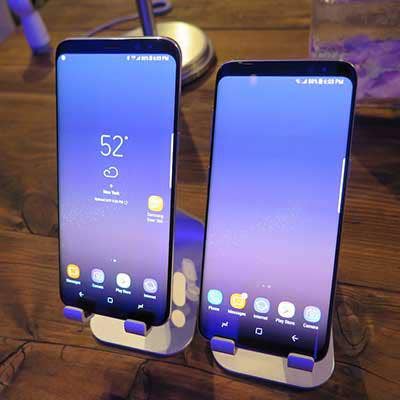
The Future Of Smartphones?
Samsung Wednesday shared its fresh new smartphone vision with the unveiling of the Galaxy S8 and Galaxy S8+. The company is hoping the phones -- both of them including large screens and novel features -- will not only allow the company to move past the Galaxy Note 7 debacle, but will also one-up Apple and its largely incremental iPhone 7. The CRN Test Center was on hand for a demo of the new devices this week in New York, and so in the following slides we've rounded up the key things to know on specs and features of the Samsung Galaxy S8 and Galaxy S8+.
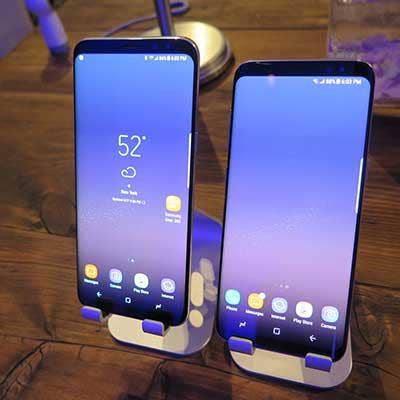
Display
The most-noticeable difference is that Samsung has bumped up the display size on its newest smartphones: The Galaxy S8 features a 5.8-inch display and the Galaxy S8+ measures 6.2 inches. But the phones don't feel huge thanks to the near-elimination of the bezels. The so-called Infinity displays cover 83 percent of the front of the phones, in fact. Samsung has also removed the physical home button to make room for more display -- but the bottom of the display is still pressure-sensitive so that it behaves like a home button.
The displays are Super AMOLED with Quad HD+ (2,960 x 1,440) resolution, and will feature curved glass that tapers over the edges of the phone. The large size of the displays could enable better experiences for users with options such as multiwindow usage -- for instance, reading a web page in one window and responding to an email or text message in a second window.
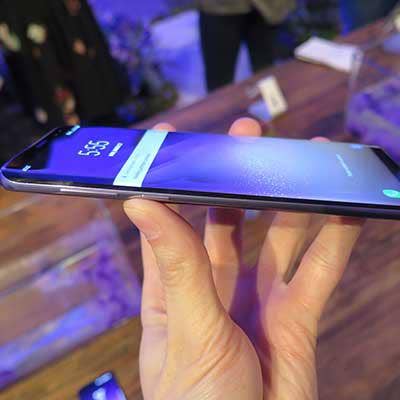
Thickness And Weight
While the Galaxy S8 and S8+ feature larger screens than the 5.1-inch Galaxy S7 and 5.5-inch Galaxy S7 Edge, that doesn't mean Samsung has had to bulk up the phones all around. The Galaxy S8 measures 0.31 of an inch thick and weighs about a third of a pound, the same as the Galaxy S7. The Galaxy S8+ is just a bit heavier at 0.38 of a pound but still just 0.32 of an inch thick. We were impressed with the lightness and thin profile of the phones while handling them -- they definitely stand out from other phones in the 6-inch range now on the market.
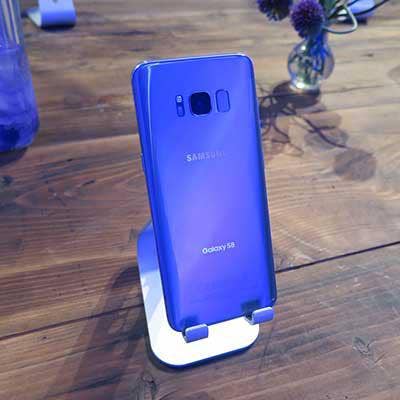
Processor
The biggest internal advancement for the new Galaxy smartphones is the inclusion of Qualcomm's new Snapdragon 835. The 10-nanometer chip is 35 percent smaller than the Snapdragon 821 and also easier on the battery life (offering a 25 percent reduction in power needs). And, of course, the octa-core processor is faster -- with a clock speed of up to 2.45GHz.
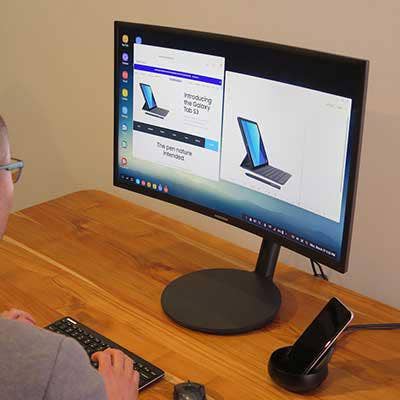
DeX
One special ability of the Galaxy S8/S8+ is that it can power a desktop experience, by connecting to a special dock. That dock can connect to a display, keyboard and mouse -- and create an Android desktop that provides a Windows-like experience. The feature, called DeX, will let users work both in Android apps and also in virtual desktops. The virtual desktops will be powered by Citrix, VMware and Amazon Web Services, and will require a license from one of the virtual desktop providers, Samsung officials said. The feature closely resembles the capability of the HP Elite x3 to power a desktop, using a dock and Microsoft's Continuum technology.
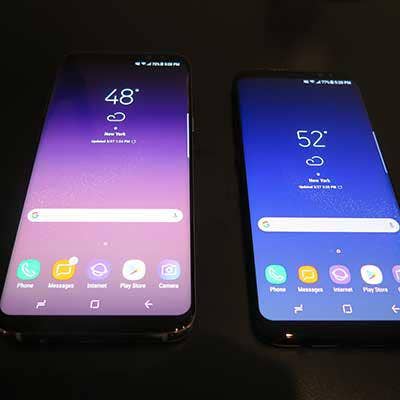
Knox Configure
Samsung said the Galaxy S8/S8+ will be the first smartphones to support a new feature for businesses called Knox Configure, which offers over-the-air bulk configuration of devices. If an enterprise wants all of its users in the field to have the same configuration and setup process on their device, Knox Configure will allow for that level of control, according to Samsung. The end result is that enterprises can more easily provide the "same look and feel" for all users of the Galaxy S8/S8+ in a corporate deployment, the company said.
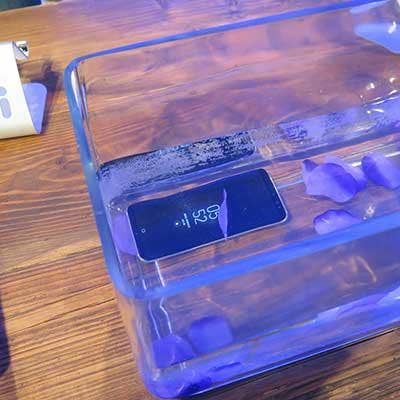
Water Resistance
The Galaxy S8/S8+ comes with an IP68 rating (the same as the Galaxy S7). That means the device is expected to survive if it ends up in water for a half-hour -- so long as the water isn't deeper than 5 feet. During the demo this week, Samsung officials encouraged dropping the Galaxy S8 in a tank of water to show just how water-resistant the device really is.
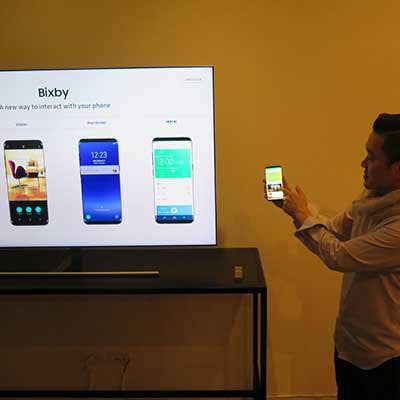
Bixby
Samsung is debuting its new Bixby virtual assistant with the Galaxy S8/S8+, and the goal is to offer a different approach from that of Siri. On voice interaction, Bixby aims to let you do any task with your voice that you would normally need to accomplish with touch (Samsung gave the example of asking Bixby, "send the latest photo to my wife"). Bixby also has vision capabilities -- for instance, you can point your phone at landmarks and Bixby will provide history about them, or you can point the phone at a product and Bixby will pull up more information or shopping options. Meanwhile, Bixby also offers schedule reminders as well as recommendations. And, Bixby launches by pushing a button on the side of the phone, rather than by pushing a home button or saying a wake word.
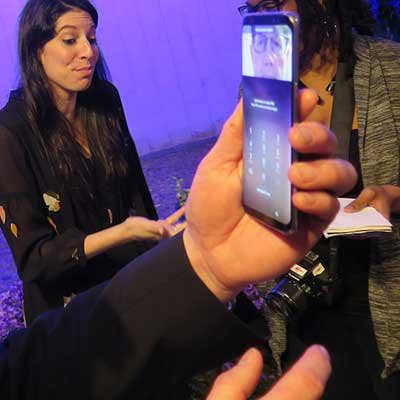
Biometrics
Samsung is offering a number of options for biometric authentication with the Galaxy S8 and S8+. The fingerprint scanner is retained, though it's been moved to the back of the device due to the removal of the home button. But Samsung has also added iris scanning (a feature that had been part of the Galaxy Note 7) to the Galaxy S8/S8+, along with facial recognition.
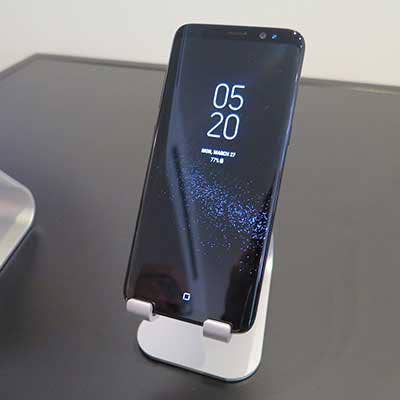
Battery, RAM And Storage
The battery size in the Galaxy S8 will be on par with the S7 -- 3,000mAh. The Galaxy S8+ will get a 3,500mAh battery, which is actually below the S7 Edge's 3,600mAh battery. Samsung hasn't provided estimates on battery life so far, but it would appear that the battery life savings from the Snapdragon 835 are expected to help out significantly.
The Galaxy S8/S8+ will both come with 4 GB of RAM and 64 GB of storage. The storage will be expandable with a slot for a microSD card, which could add up to 256 GB of storage.
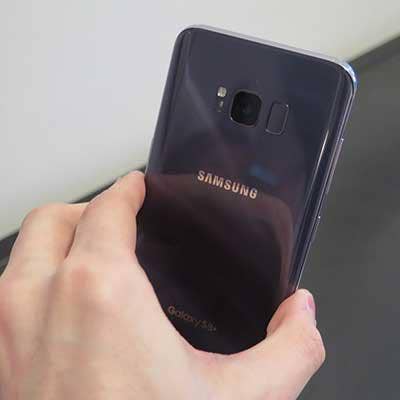
Camera And Connectors
The Galaxy S8 and S8+ will both include a 12-megapixel rear camera (equivalent to that of the Galaxy S7) with dual-pixel technology. That technology works by capturing a large amount of light to provide sharp photos even in poorly lit situations. The devices will also include an 8-megapixel front-facing camera, which represents a boost over the 5-megapixel front camera on the S7.
Meanwhile, Samsung will not be following Apple's lead on going all-wireless for audio, and will be retaining the 3.5mm headphone jack in the Galaxy S8 and S8+. The phones will also include USB-C for charging and data transfer.

Price & Availability
Samsung hasn't disclosed pricing for an unlocked version of the new Galaxy phones, instead leaving price decisions to carriers. Verizon will be selling the Galaxy S8 for a retail price of $720 and the Galaxy S8+ for $840. AT&T and T-Mobile are pricing the S8 at $750 and the S8+ at $850.
Pre-orders for the Galaxy S8/S8+ will start Friday, March 30, and the release date for the phones in the U.S. is April 21.